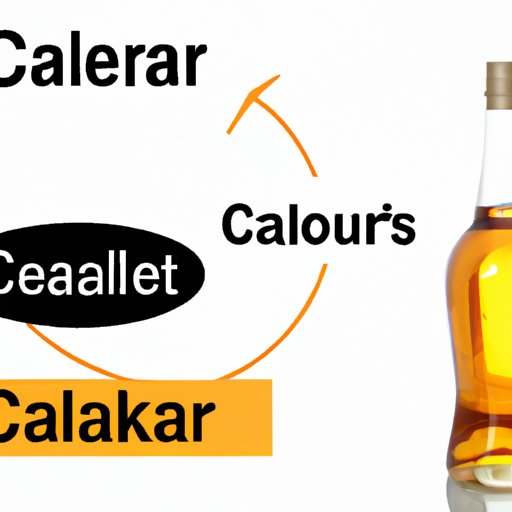
I. Introduction
Alcohol consumption and weight gain are two topics that are often linked together. Many people struggle with maintaining a healthy weight while still enjoying their favorite alcoholic beverages. Some may wonder why alcohol seems to have such a significant impact on their weight. In this article, we will explore why alcohol makes you gain weight and what you can do to manage your alcohol consumption without gaining weight.
II. The Science Behind Alcohol and Weight Gain: A Deep Dive
First, let’s understand how alcohol affects the body. When you consume alcohol, it is absorbed into your bloodstream and transported to your liver, where it is metabolized into acetaldehyde, a toxic substance. Your liver then converts acetaldehyde into acetate, which is then released into your bloodstream and used for energy.
However, the process of breaking down alcohol can have a significant impact on your body, including your weight. Alcohol is a high-calorie substance, containing 7 calories per gram, compared to 4 calories per gram for carbohydrates and protein and 9 calories per gram for fat.
Furthermore, alcohol does not provide any nutritional value, meaning that when you consume alcohol, you are consuming empty calories that provide no valuable nutrients for your body. This is why alcohol consumption can lead to weight gain over time.
Several studies have explored the link between alcohol consumption and weight gain. For example, a study published in the American Journal of Clinical Nutrition found that men who consumed more than three drinks per day had a 30% higher risk of obesity compared to those who did not drink alcohol.
III. The Relationship Between Alcohol Consumption and Increased Calorie Intake
Alcohol consumption can also lead to increased calorie intake, which contributes to weight gain. When you consume alcohol, it can stimulate your appetite, leading you to eat more than you normally would. Additionally, alcohol can impair your judgment and decision-making skills, leading you to make poor food choices and opt for high-calorie foods.
A study published in the journal Obesity found that individuals who consumed an alcoholic beverage before a meal ate more calories overall compared to those who did not drink alcohol before eating. Furthermore, the study found that individuals who consumed alcohol had a preference for high-fat foods, which can contribute to weight gain over time.
IV. How Alcohol Affects Your Metabolism and Leads to Weight Gain
Alcohol can also have a significant impact on your metabolism, which can lead to weight gain over time. Your metabolism is responsible for burning calories and converting them into energy. However, when you consume alcohol, it can slow down your metabolism, making it harder for your body to burn calories efficiently.
Additionally, when you consume alcohol, your body prioritizes breaking down the alcohol over burning fat, meaning that the fat in your body is not being burned as efficiently. This can lead to a buildup of fat in your body and contribute to weight gain over time.
A study published in the Journal of Clinical Investigation found that alcohol consumption leads to the accumulation of liver fat, which can contribute to metabolic disease and weight gain over time.
V. Understanding the Link Between Alcohol and Belly Fat
Another concern with alcohol consumption and weight gain is the link between alcohol and belly fat. When you consume alcohol, it can contribute to increased belly fat over time. Belly fat is especially concerning because it is linked to several health issues, including heart disease and type 2 diabetes.
One reason why alcohol consumption can lead to increased belly fat is because of the way that alcohol is metabolized in the body. When your liver breaks down alcohol, it releases a substance called acetaldehyde, which can interfere with fat metabolism and contribute to weight gain. Additionally, research suggests that alcohol consumption can lead to an increase in cortisol production, a hormone that is linked to the accumulation of belly fat.
A study published in the European Journal of Clinical Nutrition found that alcohol consumption, especially beer consumption, was associated with an increase in abdominal fat in men.
VI. Tips for Managing Alcohol Consumption and Preventing Weight Gain
To manage alcohol consumption and prevent weight gain, it is important to be mindful of your alcohol intake and make healthier choices. Here are some tips to consider:
- Limit your alcohol intake: Stick to the recommended guidelines for alcohol consumption, which is one drink per day for women and up to two drinks per day for men.
- Choose lower-calorie drinks: Opt for drinks with lower alcohol content and fewer calories, such as light beer or wine spritzers.
- Practice moderation: Avoid binge drinking and practice moderation when consuming alcohol.
- Pair alcohol with healthy food choices: Choose healthy snacks to pair with your alcoholic drinks, such as vegetables or fruit, and avoid high-fat, high-calorie foods.
- Stay hydrated: Drink plenty of water before, during, and after consuming alcohol to stay hydrated and help your body process the alcohol more efficiently.
VII. Conclusion
Alcohol consumption and weight gain are two topics that are often linked together. Understanding the science behind alcohol and weight gain can help you make healthier choices and manage your alcohol consumption more effectively. By limiting your alcohol intake, making healthier food choices, and practicing moderation, you can maintain a healthy weight while still enjoying your favorite alcoholic beverages.
It is important to remember that alcohol is a high-calorie substance that can slow down your metabolism and lead to weight gain over time. Belly fat is a particular concern, as it is linked to several health issues. By taking action to manage your alcohol consumption, you can enjoy the benefits of alcohol without compromising your health and well-being.





